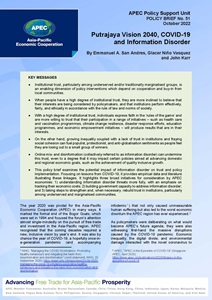Putrajaya Vision 2040, COVID-19 and Information Disorder

| Published Date | October 2022 |
|---|---|
| Type of Publication | Reports |
| Publication Under | APEC Secretariat, APEC Policy Support Unit |
| Accessed | 2492 |
| Pages | 10 |
| Download publication | Download |
Description
In 2020, APEC Leaders endorsed the Putrajaya Vision 2040 – a set of priorities for APEC’s next twenty years that, among others, emphasizes “quality growth that brings palpable benefits and greater health and wellbeing to all.” Implementation of the Putrajaya Vision 2040 began in 2021 with the adoption of the Aotearoa Plan of Action; in the same year, Leaders announced equitable access to COVID-19 vaccines as an immediate priority. However, even as governments were scrambling to acquire supplies of vaccine and establish the logistical systems to deliver doses, their efforts were slowed by a new threat: information disorder. Misinformation, disinformation, and various conspiracy theories alleged that COVID-19 vaccines were ineffective, harmful, or contaminated – with microprocessors, poisons, or pork products – and were promoted for the purpose of any number of shadowy interests, from the profit-oriented to the perverted.
This policy brief examines the potential impact of information disorder on trust and policy implementation. Focusing on lessons from COVID-19, it provides empirical data and literature illustrating these linkages, showing that information disorder can slow down or hamper the implementation of inclusive policies such as equitable access to vaccines. The paper highlights three broad policy responses for consideration by APEC economies: (1) understanding information disorder threats more fully, with an emphasis on tracking their economic costs; (2) building government capacity to address information disorder; and (3) taking steps to strengthen and, when necessary, rebuild trust in institutions, particularly among underserved and marginalized communities.
This policy brief examines the potential impact of information disorder on trust and policy implementation. Focusing on lessons from COVID-19, it provides empirical data and literature illustrating these linkages, showing that information disorder can slow down or hamper the implementation of inclusive policies such as equitable access to vaccines. The paper highlights three broad policy responses for consideration by APEC economies: (1) understanding information disorder threats more fully, with an emphasis on tracking their economic costs; (2) building government capacity to address information disorder; and (3) taking steps to strengthen and, when necessary, rebuild trust in institutions, particularly among underserved and marginalized communities.

